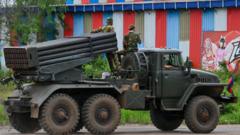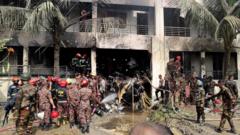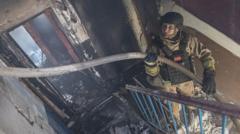Following a deadly assault near its borders with Burkina Faso and Niger, the Beninese government has revised the casualty count to 54 soldiers, highlighting the growing threat of jihadist violence in the region.
Benin Confirms Death Toll of 54 Soldiers in Al-Qaeda Attack

Benin Confirms Death Toll of 54 Soldiers in Al-Qaeda Attack
The Beninese government recognizes a significant increase in casualties from a recent attack by al-Qaeda-linked militants, marking a grim milestone in the ongoing regional insurgency.
Benin's government has officially acknowledged that 54 soldiers were killed during a brutal attack by suspected jihadists last week in the northern part of the country, close to its borders with Burkina Faso and Niger. This tragic update comes after initial reports had indicated that only eight soldiers had died, making it the deadliest incident since jihadist groups began their operations in the northern regions of Benin over a decade ago.
The attack has been claimed by the al-Qaeda affiliated group, Jama'at Nusrat al-Islam wal Muslimeen (JNIM), which originally operates out of Mali but has significantly escalated its activities in neighboring countries in recent years. Intelligence reports from the SITE monitoring group noted that JNIM claimed to have killed up to 70 soldiers during coordinated raids on two military outposts in the area.
In the wider context, the Sahel region, particularly Mali, Niger, and Burkina Faso, continues to face severe challenges from multiple jihadist factions, while Benin and Togo experience a worrying upsurge in militant activity linked to both al-Qaeda and Islamic State.
Presidential spokesman Serge Nonvignon expressed condolences for the "heavy losses for the nation" via a social media post, illustrating the gravity of the situation. Another government official, Wilfried Leandre Houngbedji, reaffirmed Benin's resolve to combat jihadist threats, promising that the nation will eventually prevail against the insurgents.
As the humanitarian crisis deepens, regional stakeholders continue to grapple with the complexities of security and governance amidst persistent violence and instability.





















